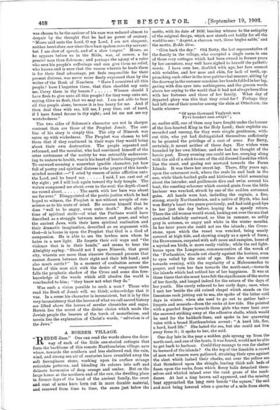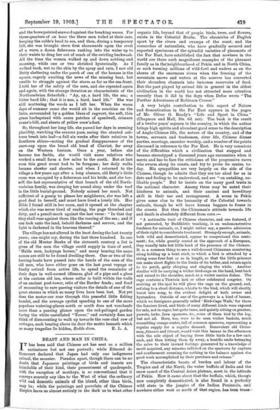A BORDER VILLAGE.
alakEDDE diem." One can read the words above the door-
11) way of each of the little one-storied cottages that form the backbone of this remote Northumbrian village, save where, towards ,the southern and less sheltered end, the rain, wind, and strong sea air of centuries have crumbled away the sett ferruginous stone, working upon its surface strange reticulate patterns, and blending its colours into soft and delicate harmonies of deep orange and umber. But on the large house at the northern end of the row, the dwelling place in former days of the head of the ancient family, the crest and coat of arms have been cut in more durable material,
was chosen to be the saviour of his race was reduced almost to motto, with its date of 1636, Warblg witness to the antiquity of the original design, which now stands out boldly for all the world to see : " Argent, a chevron vest, three bugles sable," and the motto, Redde diem.
" Give back the day." Old Betty, the last representative of the family in the village, who occupied a single room in one of these very cottages which had been owned in former years by her ancestors, may well have sighed to herself the pathetic words. I have seen her, doubled with age, her face seamed with wrinkles, and her nose and chin, for lack of teeth, ap- preaching each other in the true patriarchal manner, sitting by the doorway in the summer sunshine, her hands folded in her lap, gazing with dim eyes into nothingness, and the graven words above her crying to the world that it had not always been thus with her fortunes and those of her family. What day of departed glory was this that they cried for ? Perhaps they had left one of their number among the slain at Otterburn, the battle where- " Of nyne thowsand Ynglyssh men
Fyve hondert cam awaye" ;
or, earlier still, one of them may have fought under the banner of the lion-hearted Sing in the Holy Land ; their exploits un- recorded and unsung, for they were simple gentlemen, with. out title, who yet had distinguished themselves sufficiently to be granted the privilege of a coat of arms. For Betty, certainly, it meant neither of these days. Her wishes were bounded by her own lifetime, and she had no thought of the heroic past. Every evening one could see her, creeping along with the aid of a stick to one of the old disused limekiln which line the coast, and gazing out seaward towards the Farne Islands. It was there her secret lay. There, fifty years ago, upon the outermost rock, where the seals lie and bask in the sun, while black-backed gulls and kittiwakes whirl screaming about the intruder, and guillemots dive and swim around his boat, the coasting schooner which carried grain from the little harbour was wrecked, struck by one of the sudden autumnal gales. All hands were lost, including the captain, a fine, strong, sturdy Northumbrian, and a native of Myth, who had won Betty's heart two years previously, and had said good-bye to her just the day before, hoping for a speedy return. There the old woman would stand, looking out over the sea that stretched infinitely eastward, so blue in summer, so softly grey in autumn, so angry and white in the winter months. In her later years she could not see the islands ; the Crum- stone, upon which the vessel was wrecked, being nearly covered at high tide, and showing simply as a speck of foam; the Brownsman, carpeted with soft moss and tampion, home of a myriad sea birds, is more easily visible ; while the red light- house upon the Long,stone, commemorative of the wreck of the Forfarshire,' stands out clearly against the horizon, even to eyes veiled by the mist of age. Here she would come towards evening, with the regularity of a Mahommedan to prayer, and turn her face towards the north-east,—towards the islands which had robbed her of her happiness. It was at these times that she must have felt the significance of the motto of her family, and longed indeed for the return of the days of her youth. She rarely referred to her early days ; once, when I met her beside the old ruined chapel which stands on the limestone rock jutting out to sea, she spoke of the bitter cold days in winter, when she used to go out to gather bait—
limpets and mussels—from the rocks at low tide. She pointed with a gnarled finger towards three girls who were bent over the seaweed striking away at the adhesive shells, which would be used for the haddock-lines, and spoke in her quavering voice with a broad Northumbrian accent : " A hard life, Sor, a hard, hard life." She hated the sea, but she could not live away from it; it spoke to her, she said.
One day late in the year a sudden gale sprang up from the north-east, and one of the boats, it was feared, would not be able to get back to harbour. Could they manage to run for shelter to leeward of the islands ? On the top of the limekiln a crowd of men and women were gathered, straining their eyes against the sleet which lashed their cheeks, out over the yellow sea that thundered upon the shingle, leaving thick soft beds of foam upon the rocks, from which fleecy balls detached them-
and the bows pointed seaward against the' breaking waves. For three-quarters of an hour the three men toiled at their oars, keeping the coble's head to sea, and then, during a temporary lull, she was brought stern first shorewards upon the crest of a wave, a dozen fishermen rushing into the water up to their waists to drag her out of reach of the swirling backwash. All the time the women walked up and down sobbing and moaning, while one or two shrieked hysterically. As I walked back, wet to the skin by the spray and rain, I saw old Betty sheltering under the porch of one of the houses in the square, eagerly awaiting the news of the missing boat, but unable to struggle against the storm as far as the sea-front. I told her of the safety of the men, and she repeated again and again, with the strange iteration so characteristic of the Northumbrian fisherfolk : " Ay, ay, a hard life, the sea; a bitter hard life ; that it is noo, a hard, hard life." She was still muttering the words as I left her. When the warm days of summer came she would sit in the sunshine on the links, surrounded by a golden blaze of ragwort, the soft, thin grass harlequined with azure patches of speedwell, crimson crane's-bill, and sheets of yellow crow's-foot.
So, throughout her long life, she passed her days in seeming placidity, watching the seasons pass, seeing the- stunted ash- trees break into leaf—a full six weeks after their relatives in Southern shires—noting the gradual disappearance of the snow-cap upon the broad old head of Cheviot, far away on the Western horizon. Once a year, before she became too feeble, she would visit some relatives who worked a small farm a few miles to the south. But at last even this great event had to be foregone; her daily walks became shorter and shorter, and when I returned to the village a few years ago after a long absence, old Betty's little room was occupied by a fisherman and his bride, and she her- self, the last representative of that branch of the old.North- umbrian family, was sleeping her sound sleep under the turf in the little burial-ground. Nobody missed her much. Not sufficient of a gossip to please her neighbours, elle was left a good deal to herself, and must have lived a lonely life. Her Bible I found still in her room, and it opened at the chapter which she was never tired of reading, the page thumbed and dirty, and a pencil-mark against the last verse : " In that day they shall roar against them like the roaring of the sea ; and if one look unto the land, behold darkness and sorrow, and the light is darkened in the heavens thereof."
The village has not altered in the least during the last twenty years; one might say, during the last three hundred. In one of the old Muster Books of the sixteenth century a list is given of the men the village could supply in time of need, "Hable men, lackynge horses," and many bearing the same names are still to be found dwelling there. One or two of the herring-boats have passed into the hands of the sons of the old men, who have either gone on the last great voyage or finally retired from active life, to spend the remainder of their days in well-earned idleness, glad of a pipe and a glass at the curious old inn, whose cellar is built within the walls of an ancient peel-tower, relic of the Border feuds ; and fond of recounting to rare passing visitors the details of one of the great storms in which so many lives have been lost. Not yet does the motor-car roar through this peaceful little fishing hamlet, and the average cyclist speeding to one of the more populous watering-places north or south does not vouchsafe more than a passing glance upon the red-palinged garden facing the white castellated "Tower," and certainly does not think of dismounting to walk up towards the rose-clad row of cottages, each bearing above its door the motto beneath which so many tragedies lie hidden, Bedde diem. E. L. A.







































 Previous page
Previous page